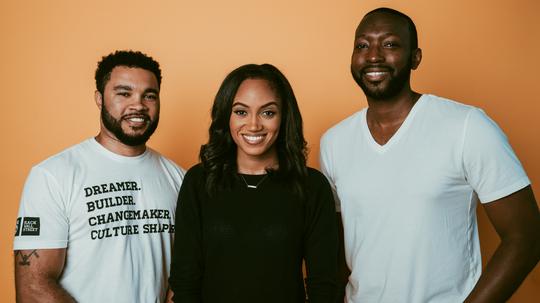
Ask Barry Givens a few months ago if he planned to announce Collab Capital was raising a $50 million fund in the middle of a historic movement of civil disobedience against racial injustice and a pandemic, he would have told you no.
"So this was actually not the plan," he said. "The plan was actually to close at the end of March or March 30."
Collab Capital is an Atlanta-based investment fund designed to connect Black founders to the financial and social capital they need to build profitable businesses. Givens, who is a general partner at Collab, a serial entrepreneur, director of the Atlanta Techstars Social Impact Accelerator and outspoken leader in the Black startup community, said as the firm prepared to make their funding announcement, the world fell apart mid-March.
"We felt the hit just like every other business," he said. "We had significant partners that had to pull back a bit. Coming out of that, we also didn’t want to continue with the press because it was tone deaf."
Announcing the fund while businesses were closing and people were dying across the world didn't feel right, Givens said. The new plan was to kick off fundraising on June 1. But just as Collab was preparing to announce its fund and the group's first investment in Atlanta beauty startup Hairbrella, George Floyd was killed in Minneapolis. His death has sparked outrage at racial injustice that has reached every corner of the country.
"This has been very tough for me," Givens said about his feelings on the current state of affairs. "We’ve been dealing with this and crying about this and yelling about it and kneeling about it. It's been going on forever, really. I tweeted about this at 1 a.m. this morning, it was heavy on me... I’m getting a lot of messages and calls from my white counterparts who want to learn and one of the things that’s really tough is the reality that we have to live with as Black people."
The tweets from Givens read as follows:
The reality of Givens' experience as a Black leader is he doesn't know if these promises or commitments to change are genuine or a business deal. But it does feel like people are listening, he said.
"Having to live with that reality is something that Black people --- especially in an executive situation --- have to deal with," he said. "...You don’t know who has what agenda. That’s the duality we have to live with."
But Givens said he is still hopeful and believes that over time people who really mean to change will still be doing the work.
"This is not a two-week sprint," he said. "This is trying to recover from centuries of racism."
The reaction from the fund's announcement has been mostly positive, with many investors reaching out across the country stating their interest in Collab, Givens said. Collab's goal of reaching $10 million of the fund by August is well ahead of schedule, he said. Next week, Collab plans to reach out to Atlanta entities, leaders and other local investors to participate.
Givens said one of the reasons startup ecosystems like Silicon Valley struggle with diversity is because of a lack of density.

"The density is there, they’re just not in an environment where they see the density," he said. "Atlanta is the best place to do it just because of the history we have here from a civil rights perspective, but also from a Black corporate perspective... The density of Black leadership we have in the city, you just don’t find in a lot of places."
Givens said that there are plenty of Black startups to help, having received applications from more than 400 Black-founded companies within a six day period during the pandemic to assist those needing to pivot their business.
"Having three Black partners in a fund, it creates confidence in Black entrepreneurs," he said. "They’ve been so jaded by the system. People don’t shoot their shot a lot of the times."
When asked what Givens looks for in an ally, he said he looks for three elements: who was doing work before two weeks ago, who's making sacrifices and who's committed for the long haul. Many funds that have now voiced commitments to working harder to fund Black founders are facing backlash, Givens said, for promising very little in the grand scheme of the total fund.
"Stuff like that happens. Did you really make a sacrifice?" he said. "You’re not losing anything. You’re not sacrificing anything. A real ally is wiling to sacrifice and lose."
How many people will still be in the fight in twelve months will also show who's willing to align themselves to change, Givens said.
"I don’t think we’ll be able to see who's real until then," he said. "Who’s writing a check? Who’s still learning? Who’s supporting the the legislation?"
During an election year, it means even more; Givens said corporations that commit to helping Black entrepreneurs but donate to President Donald Trump's campaign are not worth his time.
"If you are at this point still supporting Donald Trump, I don’t want you (as an ally)," he said. "His first rally is in Tulsa on June 19 -- Juneteenth... If you still support that, come November, if you donate to his campaign, it's a spit in the face to the Black community, the immigrant community. I don't want to be associated with that," he said. (Givens is referencing the distaste many have expressed over the scheduling of Trump's first post-Covid19 rally on Juneteenth, a holiday that celebrates the emancipation of slaves in the United States, in Tulsa, a city with a history of one of the worst cases of racial violence the country has seen: the Tulsa race massacre).
Givens said those who truly want to help the community can do so in many ways, not just by investing in Collab Capital. Across Atlanta, there are organizations like Goodie Nation and the Intentionally Good Project that have been doing good work for Black entrepreneurs for a long time, he said.
"You can invest in our fund, but these’s so many other great organizations across the country that have been doing this work for years and I think my ask would be to corporations and to individuals that really want to help, to do a little bit of research and not just go with the biggest name in the room. A lot of times, those bigger names are not in the trenches doing work," he said.
Givens also asks that those willing to make a difference or invest do not look upon their efforts as charity.
"In a lot of instances, that can come off as derogatory," he said. "I don’t want your help; I want you to treat me equally. We’re not a charity fund. We are a venture fund... This is a financial opportunity with a fund that has been investing in people who have been overlooked."








